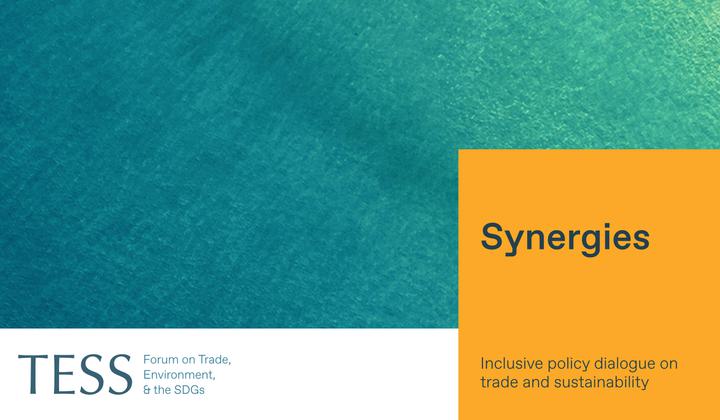About
TESS has mobilized a group of leading international experts for guidance on principles of international law relevant for consideration in the design and implementation of trade-related climate measures and policies.
A growing number of governments has expressed interest in fostering more effective multilateral dialogue on issues of climate, trade, and sustainable development, including through discussion of best practices and principles as a way to bolster shared understandings and cooperation. As a contribution to such discussions, TESS convened a group of leading experts in international law to provide guidance on principles of international law relevant to the design and implementation of trade-related climate measures and policies. The expert group was asked to identify a core set of recognized principles of international law relevant to trade-related climate measures and policies, to reflect on their interpretation and relevance, and to provide guidance on their implications in terms of the design and implementation of trade-related climate measures and policies.
The Purpose and Rationale
Faced with the urgent need to take action on the climate crisis, adapt to its impacts, and build climate-resilient development pathways, many governments and stakeholders are exploring and debating where and how trade and trade policies have a role to play.
At a time when states are considering trade-related climate measures—and amidst rising political tensions about some of these measures—the expert group was convened to offer independent guidance for governments and stakeholders on principles of international law that are relevant for consideration in the design and implementation of trade-related climate measures and policies.
The vision driving this work is that shared understandings on the relevant principles could support dialogue and inclusive international cooperation on the design and implementation of trade-related climate measures and policies.
By offering independent guidance on principles relevant for consideration, the expert group's report aims to inform and foster mutual understanding, dialogue, and international cooperation on the design and implementation of trade-related climate measures and policies in the context of sustainable development priorities.
The Principles
A core insight of the expert group’s work and report is that trade-related climate measures and policies should be understood as legal hybrids; their rationale, design, and the debates about them draw from the international law regimes relating to the environment generally, climate specifically, and international trade, along with rules and principles of general international law, human rights law, the law of the sea, and international commitments to sustainable development.
To this end, the report addresses a set of recognized principles of international law that the expert group deems especially relevant for consideration in the design and implementation of trade-related climate measures and policies. In addition to highlighting the relevance of these principles, the report aims to provide governments with some general guidance, which, it is hoped, could be useful in the design and implementation of trade-related climate measures and policies in a manner that bridges different areas of law coherently, while recognizing that the relevance and operation of principles will depend on the type of measure and context.
The principles are presented and analysed in a way that views them as cumulative and as simultaneously applicable in a mutually supportive and coherent manner, giving full effect to all relevant parts of international law, insofar as possible. This aspect of the report’s approach is consistent with the presumption, widely accepted in the field of international law generally and in WTO law consistently, that different parts of international law should, as far as possible, be interpreted and applied in a coherent and consistent manner. Notably, in its work, the expert group also highlighted the need to discuss reforms, updates, or clarifications on a range of different aspects of international law in order to support the global response at the speed and scale called for by the climate crisis while fostering sustainable development.

As governments seek to harness trade and trade policies for climate change mitigation and adaptation, and to foster climate resilience, a core challenge is how to advance climate ambition through trade-related actions, while ensuring approaches that are fair, equitable, and account for different national circumstances and capacities, including levels of development and climate vulnerabilities.
The International Legal Expert Group
The expert group drew together leading international legal experts from the climate, environment, trade, and general international law communities, participating in their personal capacities. The group was diverse in terms of its geographic representation and gender diversity, including experts from leading academic institutions in both developed and developing countries. To inform their reflections and support policy relevance and resonance, the group’s work included consultations and roundtable discussions with a range of government representatives from a diversity of countries.
Participating Experts
Professor James Bacchus (USA)
Honorary Professor Ujal Singh Bhatia (India)
Professor Umberto Celli Junior (Brazil)
Professor Dominic Coppens (Belgium)
Professor Jennifer A. Hillman (USA)
Mr. Nicolas J.S. Lockhart (United Kingdom)
Professor Dr. Makane Moise Mbengue (Senegal)
Dr. Dan Bondi Ogolla
(Kenya)
Professor Dr. Nilufer Oral (Turkey)
Professor Dr. Jacqueline Peel (Australia)
Professor Dr. Tianbao Qin (China)
Dr. Jan Yves Remy (St. Lucia)
Hon. Mr. Justice David Unterhalter (South Africa)
Professor Dr. Peter L.H. Van den Bossche (Belgium)
Professor Dr. Jorge E. Viñuales (Argentina)
Professor Dr. Margaretha Wewerinke-Singh (The Netherlands)
Professor Dr. Margaret A. Young (Australia)
Rapporteur
Convenors
Download the report!





